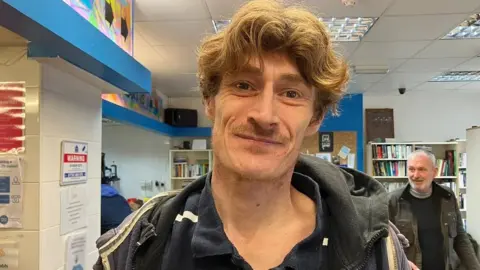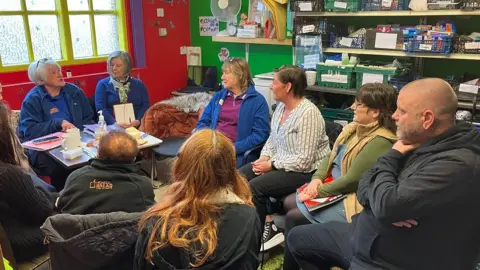Stafford homelessness charity sees rising numbers of autistic people
 BBC
BBCStaff at a homelessness charity say they are helping an increasing number of autistic people.
House of Bread, in Staffordshire, helps about 120 homeless people every week.
They are currently supporting about 20 who they believe could be autistic, director William Morris said.
One of the group, Jonathan Element, said he had been misunderstood growing up. "I was a square peg trying to fit into, not even into a round hole, into a hexagon hole; and it wasn't working."
He was diagnosed recently as autistic after long spells of sofa-surfing due to years of substance abuse.
"It's just refreshing to know that I was right," the 41-year-old said.
"I knew that there was something wrong with me, everyone said there's nothing wrong with you, but I knew there was.
"If people had have just understood that that's how I was, then I'd have been alright."
Government estimates suggest about 1% of the general population are autistic, but within the homeless community research suggests it could be much higher.

Staff at the Stafford charity have been given specialist training and Mr Morris said it would allow them to provide better help in the future.
"We know people have difficulties articulating their problems around homelessness, the definition, the way they have to communicate with statutory providers," he explained.
"What we've been able to do with the training is of course identify better and so therefore move them along in a way that makes sense."
Government figures in autumn revealed the number of people sleeping rough in England increased by 26% across a 12-month period.
Autistic people are at increased risk of homelessness, according to research by the University of Bristol.

Volunteer autism mentor Claire Brindley said it was "concerning" the link had not been researched and picked up earlier.
"All of the things that work together to make a person autistic are also the same things that can cause people to become homeless - barriers in communication, barriers to accessing financial help, barriers to getting employment," she said.
Fewer than a quarter of autistic adults are in any kind of employment, the National Autistic Society said.
Mr Element said he had never worked but hoped the charity's support would allow him to in the future.
"I know that when I come here, they notice what's the matter with you, you're not quite yourself. They guide you in the right place," he said.

Follow BBC West Midlands on Facebook, Twitter and Instagram. Send your story ideas to: [email protected]
